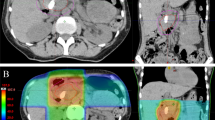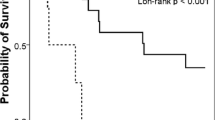Abstract
Perforation of gastrointestinal (GI) tract is a rare, but serious complication of abdominopelvic irradiation, and it can even occur several years after radiotherapy. As one of the symptoms of radiation enteropathy, it shares common features with other chronic complications and has its own characteristic at the same time. It has been reported that some systematic therapies, such as sorafenib and bevacizumab, could add the risk of radiation-induced GI perforation. The potential mechanisms of aggravated GI injury may be exacerbation of epithelial cell damage, microvascular damage or subsequent inflammatory response. The complicated situation makes it almost impossible to set uniform dose constraints for GI perforation prevention. The majority of cancer patients with GI perforation require emergency surgery, and there is no high quality evidence for supporting the use of any prevention measures. In this review, we summarize the clinical manifestation, risk factors, mechanism, and therapy of radiation-induced GI perforation. A comprehensive treatment plan is crucial to improve the quality of life for cancer survivors.

Similar content being viewed by others
References
Qi WX, Sun YJ, Tang LN et al (2014) Risk of gastrointestinal perforation in cancer patients treated with vascular endothelial growth factor receptor tyrosine kinase inhibitors: a systematic review and meta-analysis. Crit Rev Oncol Hematol 89:394–403
Bottoni C, Scambia G, Fagotti A et al (2018) The safety of bevazicumab for the treatment of ovarian cancer. Expert Opin Drug Saf 17:1107–1113
Andreyev J (2005) Gastrointestinal complications of pelvic radiotherapy: are they of any importance? Gut 54:1051–1054
Yamashita H, Nakagawa K, Tago M et al (2006) Small bowel perforation without tumor recurrence after radiotherapy for cervical carcinoma: report of seven cases. J Obstet Gynaecol Res 32:235–242
Ramirez PT, Levenback C, Burke TW et al (2001) Sigmoid perforation following radiation therapy in patients with cervical cancer. Gynecol Oncol 82:150–155
Harb AH, Abou FC, Sharara AI (2014) Radiation enteritis. Curr Gastroenterol Rep 16:383
Teo MT, Sebag-Montefiore D, Donnellan CF (2015) Prevention and management of radiation-induced late gastrointestinal toxicity. Clin Oncol (R Coll Radiol) 27:656–667
Andreyev HJ, Vlavianos P, Blake P et al (2005) Gastrointestinal symptoms after pelvic radiotherapy: role for the gastroenterologist? Int J Radiat Oncol Biol Phys 62:1464–1471
Andreyev J (2007) Gastrointestinal symptoms after pelvic radiotherapy: a new understanding to improve management of symptomatic patients. Lancet Oncol 8:1007–1017
Pathak R, Shah SK, Hauer-Jensen M (2019) Therapeutic potential of natural plant products and their metabolites in preventing radiation enteropathy resulting from abdominal or pelvic irradiation. Int J Radiat Biol 95:493–505
Isohashi F, Yoshioka Y, Mabuchi S et al (2013) Dose-volume histogram predictors of chronic gastrointestinal complications after radical hysterectomy and postoperative concurrent nedaplatin-based chemoradiation therapy for early-stage cervical cancer. Int J Radiat Oncol Biol Phys 85:728–734
Shadad AK, Sullivan FJ, Martin JD et al (2013) Gastrointestinal radiation injury: symptoms, risk factors and mechanisms. World J Gastroenterol 19:185–198
Kelly P, Das P, Pinnix CC et al (2013) Duodenal toxicity after fractionated chemoradiation for unresectable pancreatic cancer. Int J Radiat Oncol Biol Phys 85:e143–e149
George G, Lewis S, Chopra S et al (2020) A retrospective study of the dosimetric parameters and duodenal toxicity in patients with upper gastrointestinal and gynaecological cancers treated with radiation therapy. Clin Oncol (R Coll Radiol) 32:e53–e59
Verma J, Sulman EP, Jhingran A et al (2014) Dosimetric predictors of duodenal toxicity after intensity modulated radiation therapy for treatment of the para-aortic nodes in gynecologic cancer. Int J Radiat Oncol Biol Phys 88:357–362
Vargas C, Martinez A, Kestin LL et al (2005) Dose-volume analysis of predictors for chronic rectal toxicity after treatment of prostate cancer with adaptive image-guided radiotherapy. Int J Radiat Oncol Biol Phys 62:1297–1308
Jadon R, Higgins E, Hanna L et al (2019) A systematic review of dose-volume predictors and constraints for late bowel toxicity following pelvic radiotherapy. Radiat Oncol 14:57
Yeoh EK, Krol R, Dhillon VS et al (2016) Predictors of radiation-induced gastrointestinal morbidity: a prospective, longitudinal study following radiotherapy for carcinoma of the prostate. Acta Oncol 55:604–610
Carrington R, Staffurth J, Warren S et al (2015) The effect of dose escalation on gastric toxicity when treating lower oesophageal tumours: a radiobiological investigation. Radiat Oncol 10:236
Yoon H, Oh D, Park HC et al (2013) Predictive factors for gastroduodenal toxicity based on endoscopy following radiotherapy in patients with hepatocellular carcinoma. Strahlenther Onkol 189:541–546
Chopra S, Dora T, Chinnachamy AN et al (2014) Predictors of grade 3 or higher late bowel toxicity in patients undergoing pelvic radiation for cervical cancer: results from a prospective study. Int J Radiat Oncol Biol Phys 88:630–635
Pollom EL, Deng L, Pai RK et al (2015) Gastrointestinal toxicities with combined antiangiogenic and stereotactic body radiation therapy. Int J Radiat Oncol Biol Phys 92:568–576
Saif MW, Elfiky A, Salem RR (2007) Gastrointestinal perforation due to bevacizumab in colorectal cancer. Ann Surg Oncol 14:1860–1869
Inoue T, Kinoshita H, Komai Y et al (2012) Two cases of gastrointestinal perforation after radiotherapy in patients receiving tyrosine kinase inhibitor for advanced renal cell carcinoma. World J Surg Oncol 10:167
Barney BM, Markovic SN, Laack NN et al (2013) Increased bowel toxicity in patients treated with a vascular endothelial growth factor inhibitor (VEGFI) after stereotactic body radiation therapy (SBRT). Int J Radiat Oncol Biol Phys 87:73–80
Brade AM, Ng S, Brierley J et al (2016) Phase 1 trial of sorafenib and stereotactic body radiation therapy for hepatocellular carcinoma. Int J Radiat Oncol Biol Phys 94:580–587
Muraoka T, Tsukuda K, Toyooka S et al (2011) Ileal perforation induced by acute radiation injury under gefitinib treatment. Int J Clin Oncol 16:774–777
Mach CM, Urh A, Anderson ML (2014) Bowel perforation associated with temsirolimus use in a recently irradiated patient. Am J Health Syst Pharm 71:919–923
Anker CJ, Grossmann KF, Atkins MB et al (2016) Avoiding severe toxicity from combined braf inhibitor and radiation treatment: consensus Guidelines from the Eastern Cooperative Oncology Group (ECOG). Int J Radiat Oncol Biol Phys 95:632–646
Tang T, Abu-Sbeih H, Luo W et al (2019) Upper gastrointestinal symptoms and associated endoscopic and histological features in patients receiving immune checkpoint inhibitors. Scand J Gastroenterol 54:538–545
Tree AC, Jones K, Hafeez S et al (2018) Dose-limiting urinary toxicity with pembrolizumab combined with weekly hypofractionated radiation therapy in bladder cancer. Int J Radiat Oncol Biol Phys 101:1168–1171
Luke JJ, Lemons JM, Karrison TG et al (2018) Safety and clinical activity of pembrolizumab and multisite stereotactic body radiotherapy in patients with advanced solid tumors. J Clin Oncol 36:1611–1618
Stansborough RL, Bateman EH, Al-Dasooqi N et al (2018) Vascular endothelial growth factor (VEGF), transforming growth factor beta (TGFbeta), angiostatin, and endostatin are increased in radiotherapy-induced gastrointestinal toxicity. Int J Radiat Biol 94:645–655
Francois A, Milliat F, Guipaud O et al (2013) Inflammation and immunity in radiation damage to the gut mucosa. Biomed Res Int 2013:123241
Hasleton PS, Carr N, Schofield PF (1985) Vascular changes in radiation bowel disease. Histopathology 9:517–534
Bentzen SM (2006) Preventing or reducing late side effects of radiation therapy: radiobiology meets molecular pathology. Nat Rev Cancer 6:702–713
Hong S, Gu Y, Gao Z et al (2014) EGFR inhibitor-driven endoplasmic reticulum stress-mediated injury on intestinal epithelial cells. Life Sci 119:28–33
Karamchandani DM, Chetty R (2018) Immune checkpoint inhibitor-induced gastrointestinal and hepatic injury: pathologists' perspective. J Clin Pathol 71:665–671
Takatori K, Terashima K, Yoshida R et al (2014) Upper gastrointestinal complications associated with gemcitabine-concurrent proton radiotherapy for inoperable pancreatic cancer. J Gastroenterol 49:1074–1080
Lawrie TA, Green JT, Beresford M et al (2018) Interventions to reduce acute and late adverse gastrointestinal effects of pelvic radiotherapy for primary pelvic cancers. Cochrane Database Syst Rev 1:D12529
Klopp AH, Yeung AR, Deshmukh S et al (2018) Patient-reported toxicity during pelvic intensity-modulated radiation therapy: NRG oncology-RTOG 1203. J Clin Oncol 36:2538–2544
Samuelian JM, Callister MD, Ashman JB et al (2012) Reduced acute bowel toxicity in patients treated with intensity-modulated radiotherapy for rectal cancer. Int J Radiat Oncol Biol Phys 82:1981–1987
Rao AD, Feng Z, Shin EJ et al (2017) A novel absorbable radiopaque hydrogel spacer to separate the head of the pancreas and duodenum in radiation therapy for pancreatic cancer. Int J Radiat Oncol Biol Phys 99:1111–1120
Reyngold M, Parikh P, Crane CH (2019) Ablative radiation therapy for locally advanced pancreatic cancer: techniques and results. Radiat Oncol 14:95
Henson CC, Burden S, Davidson SE et al (2013) Nutritional interventions for reducing gastrointestinal toxicity in adults undergoing radical pelvic radiotherapy. Cochrane Database Syst Rev. https://doi.org/10.1002/14651858.CD009896.pub2
Wedlake LJ (2018) Nutritional strategies to prevent gastrointestinal toxicity during pelvic radiotherapy. Proc Nutr Soc 77:357–368
Langsenlehner T, Renner W, Gerger A et al (2011) Impact of VEGF gene polymorphisms and haplotypes on radiation-induced late toxicity in prostate cancer patients. Strahlenther Onkol 187:784–791
Thurner EM, Krenn-Pilko S, Langsenlehner U et al (2014) Association of genetic variants in apoptosis genes FAS and FASL with radiation-induced late toxicity after prostate cancer radiotherapy. Strahlenther Onkol 190:304–309
Kroeze SG, Fritz C, Hoyer M et al (2017) Toxicity of concurrent stereotactic radiotherapy and targeted therapy or immunotherapy: a systematic review. Cancer Treat Rev 53:25–37
Acknowledgements
This work is supported by Jinan Science and Technology Development Project (No. 201907122).
Author information
Authors and Affiliations
Corresponding authors
Ethics declarations
Conflict of interest
No author has any conflict of interest.
Additional information
Publisher's Note
Springer Nature remains neutral with regard to jurisdictional claims in published maps and institutional affiliations.
About this article
Cite this article
Zheng, Y., Gao, W., Spratt, D.E. et al. Management of gastrointestinal perforation related to radiation. Int J Clin Oncol 25, 1010–1015 (2020). https://doi.org/10.1007/s10147-020-01662-5
Received:
Accepted:
Published:
Issue Date:
DOI: https://doi.org/10.1007/s10147-020-01662-5




